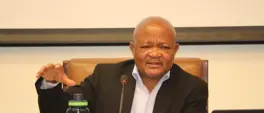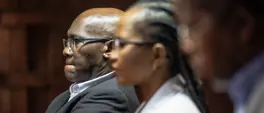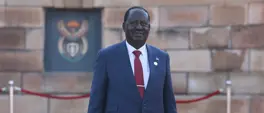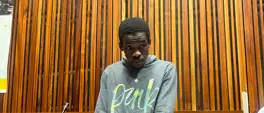Adv Mkhabela: From mineworker to shot at Gauteng High Court seat
Kgomotso Modise
13 October 2024 | 12:05The JSC held the first leg of its marathon interviews this week to fill vacancies in the country’s superior courts.
JOHANNESBURG - A former mineworker turned senior counsel who was forced to drop out of school before completing his matric has been appointed as a judge in the Gauteng division.
The Judicial Service Commission (JSC) held the first leg of its marathon interviews this week to fill vacancies in the country’s superior courts.
Over 50 candidates will take the hot seat before commissioners comprised of members of Parliament, politicians and legal professionals.
This week, candidates vying for posts in the Supreme Court, the land, labour and labour appeals courts, as well as high courts, in the Eastern Cape, KwaZulu-Natal and Gauteng were subjected to some grilling by commissioners.
The last group to be interviewed were hopefuls to be appointed as judges in the Gauteng division of the High Court.
Nine candidates were interviewed to fill six positions.
Among those recommended was Advocate Richard Mkhabela (SC), who was appearing before the commission for a second time after his unsuccessful interview in 2023.
Chief Justice Maya started the interview by marveling at Mkhabela's story.
"Yours is a truly remarkable story I think," the Chief Justice said.
Mkhabela started working as a farmworker at just 12 years old.
"I needed money to go to high school," he said.
While narrating a synopsis of Mkhabela’s life story, Maya pointed out how the advocate left school before he could complete his matric.
Mkhabela would work in the mines as a miner and a security guard at the age of 17.
After almost a decade of working in the mines, he would return to school to complete his matric, which would lead to his studies in law at Wits University.
Having acted as a judge since 2019, Mkhabela had written 47 judgments.
MKHABELA’S INTERVIEW
Advocate Mkhabela’s interview was not the best among the candidates. He was questioned on delaying in delivering some of his judgments, something the JSC does not take lightly.
"I think I shot myself in the foot by acting for two terms consecutively and I was not able to complete the judgments because I was also running my practice," Mkhabela said.
Gauteng Judge President Mlambo pointed out how there were five judgments that took Mkhabela seven months to complete, significantly above the three months described by the judicial norms and standards.
"There are two that took you nine months, there is one that took you 13 months, there’s one that took 12 months… What will change for us not to see this problem if you are recommended for permanent appointment?" Mlambo asked.
Mkhabela made reference to his practice.
"I think what will change now is I will not be juggling my practice with acting," Mkhabela said.
Mkhabela would later be recommended among six other colleagues for appointment to the High Court.
PROFESSOR MOSES PHOOKO
A more compassionate side of the JSC was also experienced by a candidate this week who was also vying for seat at the Gauteng High Court.
Fort Hare University professor, Moses Phooko, started his interview by giving a detailed oration.
"When Judge President Mlambo identified me as a raw diamond from Matatiele, he threw me in the High Court in the deep end. The basis for that was that I go through the rigorous process, so I can be familiar with the art of writing judgments, trying to convert my academic writing into well reasoned and sound judgments, which I have mastered," Phooko said.
But from this point, it was a slippery slope as his disputes with past employers and his social media posts would come back to haunt him.
Phooko told the commission that he ran into disagreements with the universities of Johannesburg and Limpopo because of his activism.
But Advocate Kameshni Pillay was not convinced.
"For me, this has nothing to do with transformation activism, this has got to do with the fact that you entered into a settlement agreement [with UJ] which was made an order of court and that agreement imposed certain obligations on you. What I am raising to you is material non-disclosures in your form to the JSC."
Advocate Tembeka Ngcukaitobi then raised issues with Phooko’s business interests, including the ownership of a tavern in his hometown of Matatiele
"The business interests I am no longer involved in," Phooko explained.
Ngcukaitobi: "I understand that but what I am saying is that you were holding them at the same time as you were holding a judicial role in the Electoral Court. I am just worried about what people will think as you are two-timing them."
Phooko withdrew his candidature after a lashing from the commissioners but they would not let him go without sharing a bit of advice.
Judge Dumisani Zondi cautioned him against the use of social media after UJ secured a court order to stop him from posting about their dispute.
"My advice to you is if you are really serious to progress in life generally, just stay away from from social media because it attracts so much negative energy that you don’t need," Zondi said.
Judge Dunstan Mlambo also had some words for the professor.
"I want to encourage you to say: 'Come, let's talk' because I don't want my investment in you to be lost."
Phooko was advised by commissioners to take a "cooling off" period before returning to the JSC.
Interviews will continue this week with vacancies in the high courts in the Western Cape, Limpopo and Mpumalanga to be filled.
Get the whole picture 💡
Take a look at the topic timeline for all related articles.
Trending News
More in Local

16 October 2025 06:51
Action Society to support Cape Town mom whose baby was snatched in mall 'to ensure justice is done'

16 October 2025 06:38
WC police to deploy more cops to crime hotspots, tourist attractions

16 October 2025 06:36
Umalusi satisfied with measures in place to address risks identified at high-risk exam centres












